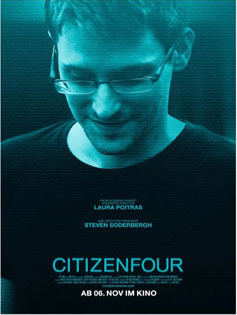
Germany | USA 2014
Starts November 6, 2014
Directed by: Laura Poitras
Writing credits: Documentary
Cast: Glenn Greenwald, Ewen MacAskill, Edward Snowden
Length: 114 minutes In 2013 American director Laura Poitras received an encrypted e-mail message at her Berlin home from a mysterious Citizenfour. It was not unusual for her to be living in Berlin, nor to receive mysterious messages, since her films My Country, my Country and The Oath had already raised the ire of U.S. security. She was invited to interview someone in hiding who wished to speak to the world. She arrived with Rio-de-Janeiro-based journalist Glenn Greenwald and Ewen MacAskill of the London Guardian. Together they sat in a hotel room in Hong Kong with none other than 29-year-old Edward Snowden, the whistle blower who had lifted the lid on National Security Agency (NSA) secrets. The U.S. government knew he was missing, but not exactly where he had taken refuge. Poitras films while MacAskill and Greenwald ask questions and take notes. They debate how to present these facts. Snowden is emphatic about letting the facts speak for themselves, without any bravado or limelight on his part. He sees himself as the conduit, but not the actual news. He accepts that the consequences will be dire. Between talks in Hong Kong we flash back to discussions in the U.S. congress where senators and even President Obama curtly deny any kind of espionage against U.S. citizens and, anyway, “people are willing to sacrifice their civil liberties” when it comes to security. Keith Alexander, director of the NSA says, “We are not authorized to do it (hacking) nor do we do it.” He is just one of many associated with the organization who repeat this or similar statements. Snowden gives details about TEMPORA and GCHQ (Government Communication Headquarters) two British internet surveillants, as well as a U.S. counterpart XKeyscore, which could hack one billion phones simultaneously in 2011. The Guardian breaks Snowden’s news which is picked up by other media and quickly spreads around the world. The film shows people in important positions (German chancellor Angela Merkel, Wikileaks Julian Assange, American Civil Liberties Union lawyers, etc.) taking sides, giving support, showing outrage or acceptance.
In 2013 American director Laura Poitras received an encrypted e-mail message at her Berlin home from a mysterious Citizenfour. It was not unusual for her to be living in Berlin, nor to receive mysterious messages, since her films My Country, my Country and The Oath had already raised the ire of U.S. security. She was invited to interview someone in hiding who wished to speak to the world. She arrived with Rio-de-Janeiro-based journalist Glenn Greenwald and Ewen MacAskill of the London Guardian. Together they sat in a hotel room in Hong Kong with none other than 29-year-old Edward Snowden, the whistle blower who had lifted the lid on National Security Agency (NSA) secrets. The U.S. government knew he was missing, but not exactly where he had taken refuge. Poitras films while MacAskill and Greenwald ask questions and take notes. They debate how to present these facts. Snowden is emphatic about letting the facts speak for themselves, without any bravado or limelight on his part. He sees himself as the conduit, but not the actual news. He accepts that the consequences will be dire. Between talks in Hong Kong we flash back to discussions in the U.S. congress where senators and even President Obama curtly deny any kind of espionage against U.S. citizens and, anyway, “people are willing to sacrifice their civil liberties” when it comes to security. Keith Alexander, director of the NSA says, “We are not authorized to do it (hacking) nor do we do it.” He is just one of many associated with the organization who repeat this or similar statements. Snowden gives details about TEMPORA and GCHQ (Government Communication Headquarters) two British internet surveillants, as well as a U.S. counterpart XKeyscore, which could hack one billion phones simultaneously in 2011. The Guardian breaks Snowden’s news which is picked up by other media and quickly spreads around the world. The film shows people in important positions (German chancellor Angela Merkel, Wikileaks Julian Assange, American Civil Liberties Union lawyers, etc.) taking sides, giving support, showing outrage or acceptance.
This simple film made in a standard hotel room is certainly the best documentary of the year. It should shake up any lethargy we have about the future. Am I now on some list of unwanted persons, simply because I have typed critically branded words above and sent them to my editor? Citizenfour showed at the New York film festival this month (Oct 2014), and received support from, among other sources, the Deutsche Filmförderung and Sundance. Way beyond anything we might be used to, e.g., Michael Moore’s dramatic revelations, this speaks quietly with huge impact. In the final scene, it is evening outside Snowden’s apartment in Russia, his new home. We see faint shadows of him and his girlfriend upstairs in their kitchen, cooking dinner and, as German critic Hanns-Georg Rodek says, “as peaceful as it seems, it’s still a scene from a surveillance camera.” ()
